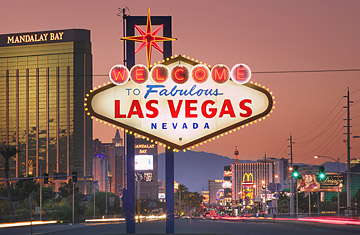
What happened to recession-proof Vegas? The short answer is that the city placed most of its bets on the tourism industry. For a long time it paid off, but, says Keith Schwer, director of the Center for Business and Economic Research at the University of Nevada at Las Vegas, "if you ride a fast horse, you have the likelihood of greater volatility."
That volatility was all positive and profitable as Las Vegas morphed from a place where people went just to gamble and get a lap dance to a destination where middle Americans wanted to vacation. It became so mainstream that even the Southern Baptists had a convention in the city. "Visitors were coming to hotels at rates of 90% — a signal to expand," Schwer explains. "And interest rates dropped, so there was readily available cash to do just that." Jan Freitag, a hotel analyst at Smith Travel Research, agrees: "There was the sense that if you build it, they will come — that there was this pent-up demand."
The city attracted convention business: 6 million attendees brought in $8 billion of business last year. No other city could compete with the entertainment, parties and number of hotel rooms. "If you put three to a room," says Schwer to illustrate the capacity Vegas has, "you could put the whole population of Wyoming in Vegas and still be able to feed, clothe and give them extra towels." (See 10 things to do in Las Vegas.)
Over the past four years, Nevada was growing jobs at two to six times the national rate. In the past decade, the state's population increased 50%, with new residents attracted by steady employment, no personal income tax and housing that seemed to grow ever more valuable (home prices increased 135% between 2000 and 2006, according to Standard & Poor's). "We thought we had decoupled from the national economy," says Schwer. Unlike the rest of country, Nevada hadn't had a downturn since the 1980s.
But Las Vegas, in doubling down on the travel sector, had not diversified its economy. As the visitor rate dropped 10% in October, average daily room rates fell 14% and gaming revenue dove 26%. The hotel-casino downturn sent ripples across the city that turned into a tsunami. "In our union halls, 30% of members were what we call travelers," says Steve Holloway of the Las Vegas chapter of the Associated General Contractors of America. "They came here for the work, and now they're going home." The construction industry alone employs 10% of Las Vegas's population.
Sales and gaming taxes fill up about two-thirds of the state's coffers. In the past few years, tax revenues for Nevada had been gaining at a double-digit rate. Now they are forecast to shrink 9% in 2009. The state is probably going to have to cut in places like education and social services — and get creative with some new taxes on business. Even the Chamber of Commerce, usually an ardent opponent of business taxes, has discussed raising taxes for the first time.
But Freitag, despite Steve Wynn's recent announcement that he will lower room rates, thinks the picture may not be all gloomy. "If you look at the hotel occupancy rate of 83.5%, well, people in other cities would be ecstatic," says Freitag. "But it's just in Las Vegas, the benchmark is 90%." And while there are reports of some struggling hotels offering free rooms to visitors who gamble as little as $100 at the tables, Scott D. Berman of PricewaterhouseCoopers says the better properties are doing relatively well, at least on weekends. "It's a segmented market," says Berman. "What's happening in one casino isn't happening next door."
Philip Shalala, head of marketing at the Hard Rock Hotel Las Vegas, says his hotel is having its best December yet — up 6%, year over year. Some of that may be due to creative marketing: the hotel had a holiday party for the city, offering two hours of free wine and beer. "It keeps up the energy of the place," says Shalala, "and it's good for employee morale." People who came in for drinks stayed to eat and gamble; that night the hotel beat its forecast take by 10%.
But the customer who once spent $10,000 to $15,000 on the tables is now spending maybe $5,000. And other customers are shopping around. "They know they can get a deal," Shalala says. "They used to call up, asking for a table at a club, not caring what it cost. These days they're saying, 'Well, I can get a table at another hotel for $1,000.'" Though Shalala hasn't dropped rates drastically to attract customers, he does throw in extras like free concert tickets, promotional chips to spend in the casinos or discounts at the retail shops.
America's fantasyland probably won't come back fully until the rest of the country recovers. Indeed, the economic hard times have only proved that the town's famous slogan — "What happens in Vegas stays in Vegas" — needs some tweaking. Now, it appears, what happens in America doesn't stay out of Vegas for very long.
